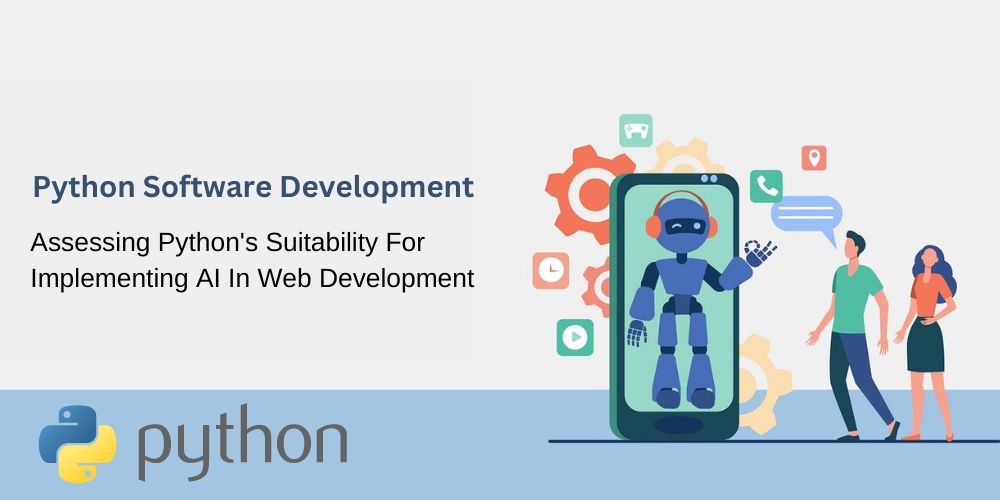29 Aug

|
Getting your Trinity Audio player ready...
|
AI is transforming how firms operate and deliver value to customers. As AI capabilities continue to advance rapidly, more firms are looking to integrate AI into their web platforms and apps.
For web development teams, leveraging AI can permit more intelligent features, insights, and automation. But what is the prominent computer language for implementing AI in web projects? Python has emerged as an ideal option due to its versatility, ecosystem, and approachability.
In this comprehensive guide, we will assess Python’s suitability for integrating AI into Python software development services initiatives.
Table of Contents
The Expanding Market Of AI In Web Development:
Before analyzing Python software development services specifically, it is worthwhile reviewing the expanding role AI is playing in modern web development:
- Enhanced User Experiences: AI powers features like personalized recommendations, predictive search, virtual assistants, and content customization.
- Increased Automation: AI can automate web development tasks like testing, debugging, performance monitoring, and deployment.
- Improved Security: AI algorithms help proactively detect vulnerabilities, fend off cyberattacks, and strengthen fraud detection.
- Higher Conversion Rates: AI optimizes sites for search engines, provides smart call-to-action plugins, and targets visitors with tailored content.
- Deeper Insights: AI analyzes web data to uncover trends, patterns, and insights that can guide strategy and decisions.
- New Capabilities: AI enables cutting-edge web capabilities like multi-lingual content, image generation, and speech recognition features.
As these use cases illustrate, AI has become vital for constructing engaging, secure, and converting digital experiences.
Why Python Is Well-Suited For Web AI:
Python possesses several inherent qualities that make it exceptionally well-suited for integrating AI capabilities into web projects:
- Easy To Learn: With simple, readable syntax and a wealth of learning resources, Python has a gentle learning curve for novice coders.
- Mature AI Libraries: Python has robust, fully-featured libraries like Tensorflow, Keras, PyTorch, OpenCV, and Sci-kit-learn for constructing and deploying AI models.
- Rapid Prototyping: Python supports agile development with the ability to quickly prototype AI-powered features and interfaces.
- Cross-Platform: Python code can run across operating systems, enabling consistent AI integration across web projects.
- Scalability: Python scales well, which is a key advantage for deploying increasingly complex AI algorithms and models into production.
- Cloud & Microservices: Python works seamlessly with key web development platforms like AWS, Docker, and Kubernetes.
- Readability: Python’s clean indented syntax and emphasis on readability make AI code easy to maintain and build upon over time.
- Vibrant Community: Python enjoys an active community and ecosystem that fosters AI innovation and collaboration.
Together, these attributes make Python a versatile, future-proof choice for integrating AI throughout the web development lifecycle.
Key AI Applications In Web Development:
Here are some of the most impactful ways Python empowers developers to integrate AI into their websites and applications:
Intelligent Chatbots
Python tools like Dialogflow, Rasa, and Python-specific machine learning libraries make creating text and voice chatbots easy for interactive sites.
Recommendation Engines
Powerful recommendation algorithms can be built using Python frameworks like TensorFlow Recommenders to display hyper-personalized content.
Automated Image Tagging And Analysis
Python libraries like OpenCV enable processing images and videos for auto-tagging, smart cropping, facial recognition, and more.
Predictive Search And Autocomplete:
Python can analyze search queries and site content to generate predictive search and autocomplete suggestions.
Multi-lingual Content Translation:
Python tools like the Google Translate API allow for translating site content into multiple languages in real time.
Sentiment Analysis:
Understand visitor attitudes, opinions, and emotions towards site content by using Python for semantic text analysis.
Fraud Detection & Cybersecurity:
Critical for e-commerce sites, Python data science frameworks help detect anomalies and strengthen cyber defenses.
Productivity Automation:
Python will permit automating repetitive web development workflows (testing, release management, performance monitoring, etc.).
SEO Optimization:
AI algorithms developed in Python can optimize pages for search ranking based on keywords, semantics, and more.
Smart Forms & Data Extraction:
Python enables processing web form data, documents, and contracts to auto-fill fields and extract key information.
The breadth of these use cases highlights Python’s versatility for diverse AI applications throughout the web stack.
Developing A Python AI Strategy:
Firms looking to leverage Python AI in their web projects should consider the following strategic steps:
Assess Current Workflows:
Conduct an audit of current development workflows and detect where injecting AI could add value.
Take An Iterative Approach:
Start with a few high-impact AI proofs of concept and progressively expand the scope based on lessons learned.
Inventory Available Data:
Survey existing site data like traffic analytics, user behavior, transactions, content, etc. that can be employed to train AI algorithms.
Define Roles & Processes:
Clarify how roles and processes may evolve to support developing, deploying, and managing AI models over the long term.
Mitigate AI Risks:
Develop plans to address potential AI risks around biases, security vulnerabilities, model opacity, and more.
Cultivate AI Expertise:
Grow internal skills through training programs, hiring AI specialists, and leveraging external AI development partners.
Monitor AI Performance:
Implement mechanisms to continually collect performance data and user feedback on implemented AI features.
Why Employ Python AI For Your Web Team?
Here are the primary reasons Python software development services teams should actively evaluate and adopt Python-driven AI:
- Achieve competitive differentiation through cutting-edge intelligent features.
- Better leverage web platform data to uncover value.
- Reduce development costs through AI automation.
- Overcome talent shortages by enabling more junior developers to leverage AI.
- Boost overall engineering efficiency and velocity.
- Increase user engagement, retention, and satisfaction over the long term.
- Position web properties to continuously get smarter and deliver more value.
- Enable closer alignment between web development and data science teams.
- Future-proof skill sets and career trajectories for developers
Conclusion:
Python provides an ideal programming language for unlocking the full potential of AI across the web development lifecycle. Python combines versatility, approachability, and an extensive ecosystem of AI libraries and frameworks that make AI integration accessible to developers at any skill level.
As firms look to stay competitive and drive value via intelligent interfaces, automation, insights, and capabilities, they need look no further than Python for a future-proof solution. With its balance of productivity and performance, Python enables web teams to efficiently build, deploy, and scale AI applications that were previously out of reach.


